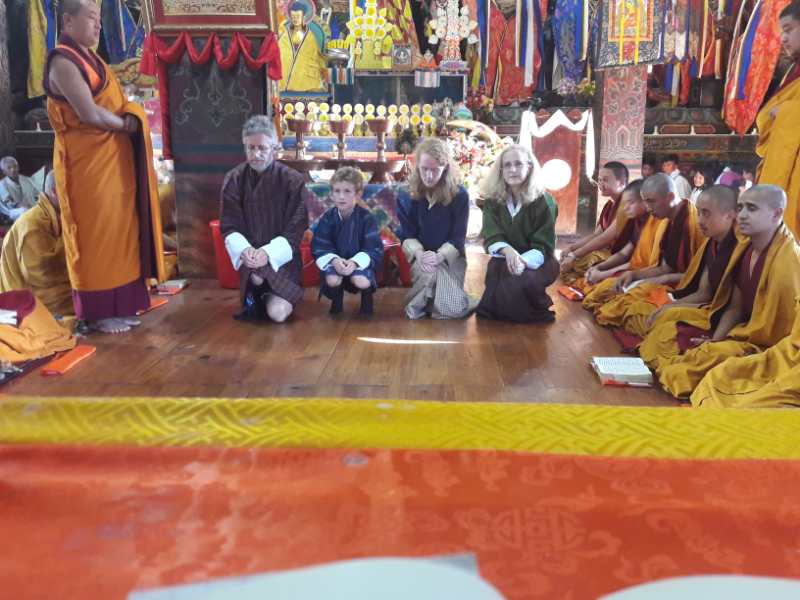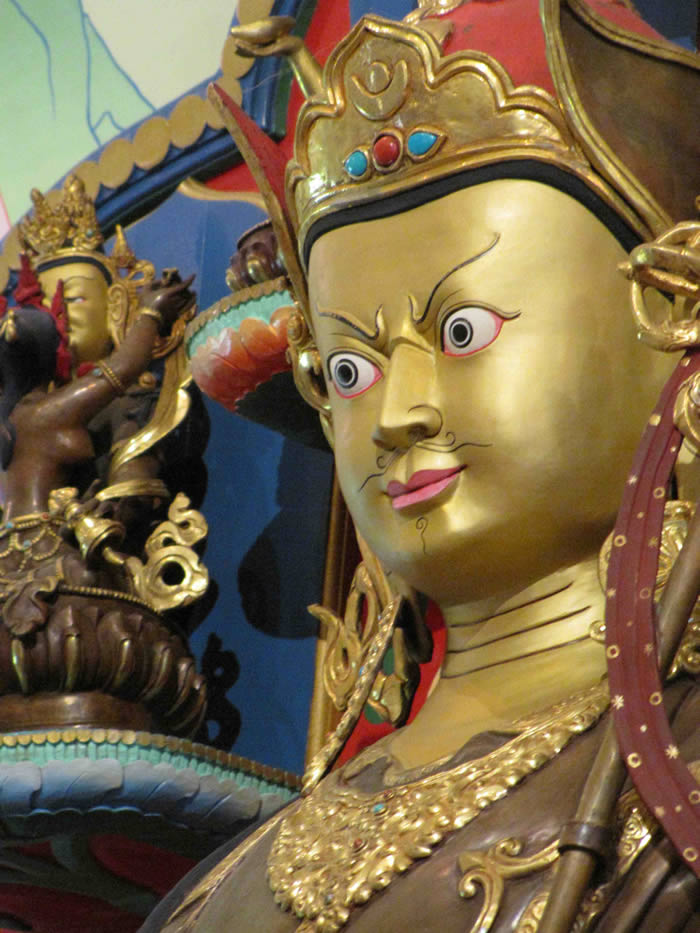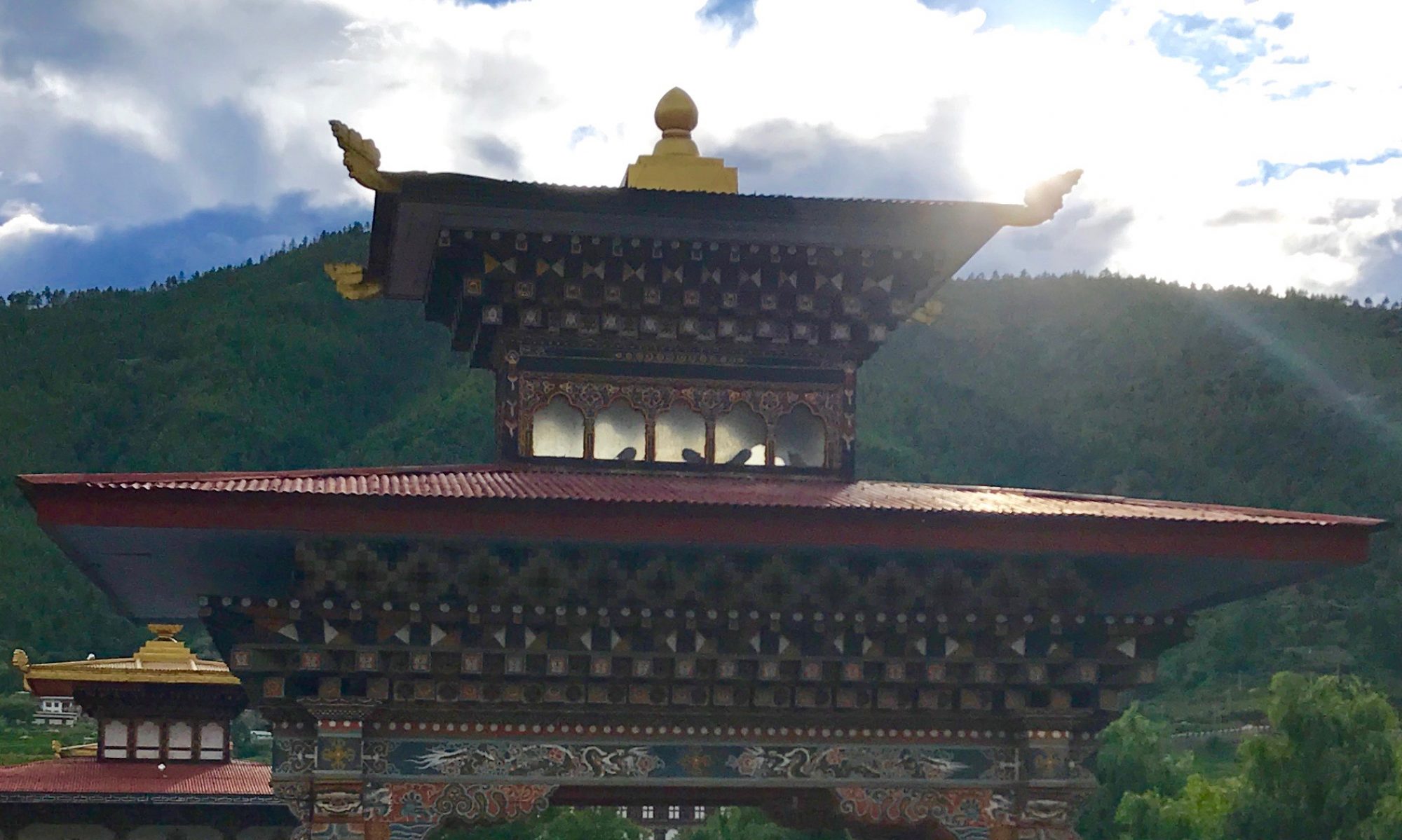Today, we went as a family to offer tea to the monks and receive blessings in return. (When I spoke to the monk at the gate, I suggested we might just make the offering, but he thought it would be a good thing for us to receive blessings too. I think the reciprocity helps to integrate us into the community.) On Wednesday evening after prostrations, I took the money to the gate with Chencho, and we arranged to offer tea Friday afternoon, a time when Chencho could be there to help guide us through the steps. In the end, though, something came up and she couldn’t make it to the temple in time, so we were on our own.
We should have brought katas, but we didn’t realize or remember (I should have known)—so the monk at the gate gave us one for the family. James, as “head of the family” was in charge of the kata. It had to be compressed in an accordion-fold (this brought back memories of Lobsang’s quick fingers creating accordion folds in any scarf that came his way), and then wrapped around itself. Then, at the appropriate moment, James was to snap the scarf sharply to release it from the folds and hand it to the inside managing monk. He would then carry it forward to the abbot—sometimes he shakes it out grandly—every now and then the scarf, floating through the air, would catch on the stubble of a monk’s shaved head.
The kata explained, then came the next part of the instructions: we were to go up before the abott and monks, prostrate three times, then give the scarf to the lead monk. We would then prostrate three more times, then crouch. Then we should prostrate three more times, then go up to the abbot in a line to receive a blessing. Then we would go to the side, prostrate three times to the statues, and sit down.
James bore the burden of the ritual steps and found it all a little stressful. But we got through it!
Again, we have been careful not to take pictures inside the temple, but one of the monks took this photo of us, and then it went shooting around the community. I can’t tell you how many times someone said to me, “I saw a picture of your family at the temple, offering something.” When I say we offered tea, the other person says approvingly, “That was well done.” One of my students eventually shared the picture with me.

After we had been sitting a while, one of the monks brings over the bottle of holy water and pours a little into each of our hands.
Today, the holy water has a resinous taste, as if it were flavored with local pine somehow– vaguely reminiscent of rosemary, but a little closer to pine. Maybe the local cypress? Briefly, I feel weepy and overwhelmed. I miss Lobsang–perhaps the taste reminds me of the Kalachakra initiation in Dharmsala, the way our senses offer different paths to our emotions and our minds.
The statues are massive and surrounded with textured backdrops, as if they’re partly statue, and partly bas-relief. I spend some time looking at a protector deity I take to be Mahakala (guardian deity of Bhutan), with a head of skulls. I think I’m sitting directly in front of the female version, who holds a corpse in her mouth, but I can’t quite get the right angle to see the identifying features of the statue. The statue I can see has a tongue standing up in his mouth like standing wave, with the top cresting over to the right. The static nature of the statue makes some of the more macabre imagery curious rather than terrifying. I wouldn’t want to meet a protector deity on a dark night, but in the light, meditating on his components seems more interesting than frightening.


After the temple, we went home, and then we went over to Chencho Dema’s and Chimi Dorji’s for dinner. We started with suja (butter tea–not a hit with my family!–but better than my previous fleeting experience) and apples, and then progressed to a feast, prepared mostly by a young woman from Mongar whom Chencho calls her sister, who seems to act as something like an au pair–looking after the children and fixing food, etc. Chencho made us some Indian bread, Chimi Dorji made a paneer curry. We also had ema datse, potato curry, beans, two kinds of rice, dal. I should have taken a picture!
Chimi Dorji was out most of the time we were there, helping a friend whose car had broken down on the road. But when he arrived, he fully lived up to his reputation as a charismatic and gregarious person…
